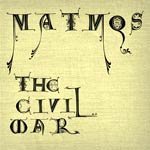
Matmos The Civil War
(Matador)
Rant alert! This is a concept album. No avoiding that. It starts with that title. It extends to the musico-historical references (Matador are calling it the 2003 version of the 1990 version of the 1968 version of the 1860 version of the 1590's - which is outrageous bullshit, but magnificent bullshit). It throws in a few seconds of background musket-fire volleys (or fireworks - same difference) on tracks 4, 5, & 9. And there you have it: The Civil War.
Why? (it's a valid question)
With a title like that, you'd assume that Matmos were proposing some kind of response to the not-insignificant world events that have intervened between their last release - A Chance to Cut is a Chance to Cure - and this. That they were drawing some analogy, maybe, between the events leading up to the Gettysburg Address and the current nightmare unrealities. Interesting. Dream on.
This 'civil war' would seem to refer to nothing more destabilising than the routine domestic conflicts between two chaps who live and work together. "Hey I cooked yesterday and anyway I'm sampling my rumbling tummy." The clue's on the website: the winner of the freebie for proposing 'their favorite civil war' is Matt of Seattle who says "I've always thought the Cola wars of the 1980's were perhaps the most civil wars in the history of mankind." (!)
Confronted with such sweet na?t?where but America...?), it seems almost churlish to complain that there's something faintly rank about using the accoutrements of real conflict as sonic wallpaper. But there you go. Guernica it ain't.
So what's the music like? Pretty damn good, as a matter of fact. Well - once you get past the appalling hurdy bloody gurdy and pipes and bassoon and faux-folktronica of the opening two tracks. (Honestly, it makes you yearn for the good old days of those choice Matmos samples of cracking nasal gristle and draining lipids and gurgling extractors on A Chance to Cut.)
It's worth waiting, though, for the sublime emergence of a kind of cajun/zydeco version of (I swear) Mama's little baby loves shortening bread out of a familiar blizzard of bleeps and whirring beats in Reconstruction. Which, in turn, gives way to some perfectly home-baked (mmm, smell dem apples) acoustic guitar, strumming away, all fret-squeaks and languid bottle-slides, at some folk tune or other (Appalachian? Okie? who cares, so long as it's as lush and homie and all-over yummy-yum-yum as this?). Which segu? in Yield to Total Elation, into something equally familiar, equally Southern porch pickin' session (it's on the tip of my mind), barely electro-embellished at all by anything more recent than the Moog. Which in turn....
Yup, they're on a nostalgia roll, are Messrs Schmidt & Daniel of San Francisco, playing - intentionally? who knows? - with the historically westward migration of notions of freedom - taking note, en route, of the transmogrification of the Stars and Stripes Forever into a Barnum and Bailey trademark, and rolling, inevitably, up to that local black hole of unreality, the one that's nestling in the foothills of Hollywood. The Struggle Against Unreality Begins (Track 8) is a curiously iconographic climax (I choose my words carelessly) - a clear homage to the primrose Hollywood epic in general, and to its generic composer, Miklos Rozsa, in particular. Using a literal pulse (a recording of M.C.Schmidt's carotid artery) as the establishing beat, it builds, via a sequence of rambling jangling circling-but-not-not-quite-duelling banjos and Tibetan singing bowls, into a mighty, booming, driven rhythm that's calculated to urge every last joule of oil-slicked galley-slave's energy to achieve that critical, murderous ramming-speed - oh! the innuendo!
This is a long way from the whimsical days of the Twirl - Photoshoot remix on Kid 606's ps You Love Me - and several counselling sessions on from the Aspergers Americana of their arid 1999 album The West. Past work has tended to crystallise around the sheer bizarreness of their sound sources (plastic surgery, rat cages, balloons and whoopie cushions, latex clothing, walkie talkies, the amplified synapse of crayfish nerve tissue). In this, Matmos' fifth studio album, the growth of a simple compositional appetite has led them to draw on the musically more gifted skills of an eclectic and very respectable group of collaborators: Steve Goodfriend and Jim Putnam of Radar Bros, Jay Lesser, Tim Barnes, Keenan Lawler, David Grubbs, Blevin Blectum, and the hugely accomplished Mark Lightcap, among others. Musically, it's by far their most rounded and satisfying album to date. (And I didn't mention Gudmundsdottir once.)
30 October, 2003 - 00:00 — Paul Roylance